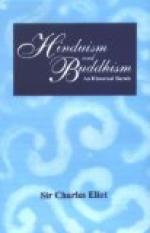Is then Buddhist doctrine, as opposed to the superstitions tolerated by Buddhism, something exotic and without influence on the national life? That also is not true. The reader will perceive from what has gone before that if he asks for statistics of Buddhism in China, the answer must be, in the Buddha’s own phrase, that the question is not properly put. It is incorrect to describe China as a Buddhist country. We may say that it contains so many million Mohammedans or Christians, because these creeds are definite and exclusive. We cannot quote similar figures for Buddhism or Confucianism. Yet assuredly Buddhism has been a great power in China, as great perhaps as Christianity in Europe, if we remember how much is owed by European art, literature, law and science to non-Christian sources. The Chinese language is full of Buddhist phraseology,[584] not only in literature but in popular songs and proverbs and an inspection of such entries in a Chinese dictionary as Fo (Buddha), Kuan Yin, Ho Shang (monk)[585] will show how large and not altogether flattering a part they play in popular speech.
Popular literature bears the same testimony. It is true that in what are esteemed the higher walks of letters Buddhism has little place. The quotations and allusions which play there so prominent a part are taken from the classics and Confucianism can claim as its own the historical, lexicographical and critical[586] works which are the solid and somewhat heavy glory of Chinese literature. But its lighter and less cultivated blossoms, such as novels, fairy stories and poetry, are predominantly Buddhist or Taoist in inspiration. This may be easily verified by a perusal of such works as the Dream of the Red Chamber, Strange Stories from a Chinese Studio, and Wieger’s Folk Lore Chinois Moderne. The same is true in general of the great Chinese poets, many of whom did not conceal that (in a poetic and unascetic fashion) they were attached to Buddhism.
It may be asked if the inspiration is not Taoist in the main rather than Buddhist. Side by side with ethics and ceremony, a native stream of bold and weird imagination has never ceased to flow in China and there was no need to import tales of the Genii, immortal saints and vampire beauties. But when any coherency unites these ideas of the supernatural, that I think is the work of Buddhism and so far as Taoism itself has any coherency it is an imitation of Buddhism. Thus the idea of metempsychosis as one of many passing fancies may be indigenous to China but its prevalence in popular thought and language is undoubtedly due to Buddhism, for Taoism and Confucianism have nothing definite to say as to the state of the dead.




